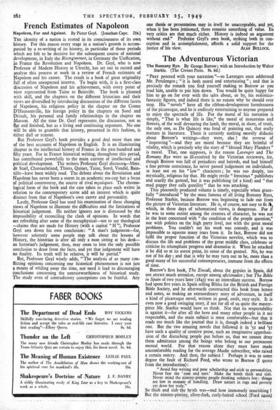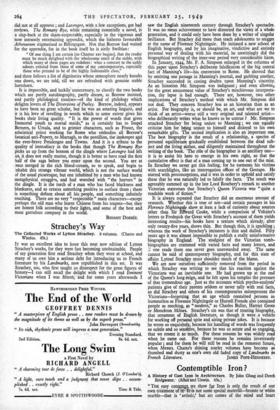The Adventurous Victorian
The Romany Rye. By George Borrow; with an Introduction by Walter Starkie. (The Cresset Press. 9s. 6d.) " PRAY proceed with your narration "—so Lavengro once addressed Mr. Petulengro ; " it is both moral and entertaining " ; and that is precisely the remark you find yourself making to Borrow as you read him, unable to put him down. You would be quite happy for him to go on for ever with the tales about, or by, his realistico- fantastic figures, and indeed there is no reason why he should ever stop. His " novels " have all the ribbon-development formlessness of the picaresque, and he is endlessly entertaining to anyone prepared to enjoy the spectacle of life. For the moral of his narration is simply, "That is what life is like," the moral of mountains and flowers, of the wolf devouring the lamb, the moral, in short, of truth, the only one, as. De Quincey Was fond of pointing out, that really matters in literature. There is certainly nothing morally didactic about Borrow's writings—they were, alas ! the reverse of "improving "—and they are moral because they are brimful of vitality, which is precisely why the story of " blessed Mary Flanders " is moral. That, one supposes, is the reason Lavengro and The Romany Rye were so ill-received by the Victorian reviewers, for, though Borrow was full of prejudices and hatreds, and had himself a fine private conscience, he never passed judgement on individuals, at least not on his " low " characters ; he was too deeply, too mystically, religious for that. He might revile " ferocious " publishers' and scarify the genteel, but it was publishing (of a kind) and " that mad puppy they calls gentility " that he was attacking.
This pleasantly produced volume is timely, especially when grace- fully "introduced "-by the most famous of all living Romany Ryes, Professor Starkie, because Borrow was beginning to fade out from the picture of Victorian literature. He is, of course, not easy to fit ib, which, in these days of schematised views, is dangerous. For if he was to some extent among the creators of character, he was not in the least concerned with " the condition of the people question," nor with politics on the high party level, nor with the great moral problems. You couldn't say his work was comedy, and it was impossible to squeeze many tears from it. In fact, Borrow did not fulfil the proper function of the Victorian novelist, which was to discuss the life and problems of the great middle class, celebrate or criticise its triumphant progress and dramatise it. When he attacked it he did so at its sorest point, its sense of the genteel. No, he was not of his day ; and that is why he may turn out to be, more than a good many of his successful contemporaries, immune from the effects of time.
Borrow's first book, The Zincali, about the gypsies in Spain, did not attract much attention, except among aficionados ; but The Bible in Spain of two years-later (1843) was an immediate success. Borrow had spent five years in Spain selling Bibles for the British and Foreign Bible Society, and he afterwards constructed this book from letters and notes, so making an extraordinary story of adventure, in itself a kind of picaresque novel, written in good, swift, racy istyle. It is even now a good swinging story, if not for all of us quite the master-
-piece Mr. Starkie would have us think. Not that its respectability is against it—for after all the hero and many other people in it are respectable, and the main subject is most comfortable—but that it reads too much like the journal that it is, though indeed a brilliant one. But the two amazing novels that followed it in '51 and '57 have such a quality of creative prose, such an imaginative apprehen- sion of the disturbing people put before us, that we cannot deny them admittance among the beings who belong to our permanent mental world. For that reason alone they must have made uncomfortable reading for the average Mudie subscriber, who raised a certain outcry. And then, the subject ! Perhaps it was to some degree the fault of Richard Ford, who wrote to Borrow (I quote from the introduction):
"Avoid fine writing and poor scholarship and stick to personalities. Never fear the rum and rare.' Make the broth thick and slab. Never mind the niminy-piminy people thinking subjects low : things are low in manner of handling. Draw nature in rags and poverty yet draw her truly."
So thick and slab' the broth was—and how immensely nourishing ! But the niminy-piminy, silver-fork, curly-haired school (Ford again)
did not at all approve ; and Lavengro, with a few exceptions, got bad reviews. The Romany Rye, while remaining essentially a novel, is a slap-back at the sham-respectable, especially in the vigorous and now intensely entertaining appendix, which the hitherto favourable Athenaeum stigmatised as Billingsgate. Not that Borrow had waited for the appendix, for in the book itself he is airily Swiftian: " Of one thing I am certain [so Chapter xxv begins], that the reader must be much delighted with the wholesome smell of the stable, with which many of these pages are redolent: what a contrast to the sickly odours exhaled from those of some of my contemporaries, especially those who pretend to be of the highly fashionable class,"
and there follows a list of dignitaries whose atmosphere nearly knocks one down, we are told, till we are refreshed with genuine stable hartshorn.
It is impossible, and luckily unnecessary, to classify the two books which are partly autobiography, partly dream, as Borrow insisted, and partly philological treatises—of the kind of philology which delights lovers of The Diversions of Purley. Borrow, indeed, appears to have been no great scholar, but he was an amazing linguist, and it is his love of revelling in words which to some extent gives his books their living quality. " It is the power of words that gives Immortal youth to mortal maids," as it certainly has to Isopel Berners, to Ursula, and to grimier characters, such as Fraser, the atheistical priest working for Rome who embodies all Borrow's fanatical anti-Popery, to Murtagh, to the postillion, the innkeeper alid the ever-brave Petulengro and Tawno. And it is a tribute to the quality of immediacy in the books that though The Romany Rye picks us up from the bottom of the dingle where Lavengro had left us, it does not really matter, though it is better to have read the first half of the saga before you enter upon the second. You are at Dnce merged in the rich blood-stream, so to speak, and begin to inhabit this strange vibrant world, which is not the surface world of the usual picaresque, but one inhabited by a man who had known metaphysical struggles, and had wrestled with "the horrors" in the dingle. It is the torch of a man who has faced blackness and blankness, and so creates something positive to outface them; is something defiant about all his people, and something innitely touching. There are no very " respectable " main characters—except perhaps the old man who learnt Chinese from his teapots—but they are honest folk according to their lights, and some of the best and most garrulous company in the world.
BONAMY DOBREE.



































 Previous page
Previous page